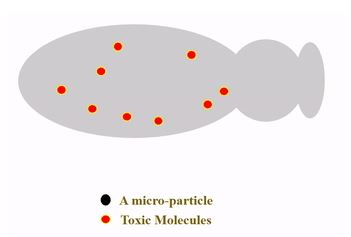WSU’s Entrepreneurship Community “A-Buzz” with Successful New Student Startup BeeToxx
By Meagan Garrett

For the past six months, a unique, multidisciplinary team of students has been working together to solve the problem of bee death and colony collapse. Their story of building a strong multidisciplinary team to move a product from lab to launch is taking the WSU and Northwest entrepreneurship scene by storm.
Rachelle Muzones (’18 Bioeng.) was a semester away from graduation and looking for a project for her capstone class when her friend Derick Jiwan introduced her to Waled Suliman, a WSU postdoctoral research associate in the Department of Biological Systems Engineering. Suliman, researching bee death and colony collapse, had just invented an additive that could be mixed with bee feed that, when fed to colonies, could protect them from the harmful effects of encountering pesticides during pollination.
“I knew this project related to my major, and one of my main motives for joining was to learn more about bioengineering,” says Muzones, “What really drew me in was the higher impact I saw this solution could have on the world. I started to learn about bee death and colony collapse and why that was so potentially harmful to the global food supply chain. I knew I wanted to get involved.”
What is bee death and colony collapse? How can BeeToxx stop it?
 According to the Environmental Protection Agency, colony collapse occurs when the majority of the worker bees in a colony disappear and leave behind only the queen and the immature (baby) bees. This poses a major threat to the bee population, as it cannot survive without the worker bees to protect the queen, make honey, and continue to propagate the next hives.
According to the Environmental Protection Agency, colony collapse occurs when the majority of the worker bees in a colony disappear and leave behind only the queen and the immature (baby) bees. This poses a major threat to the bee population, as it cannot survive without the worker bees to protect the queen, make honey, and continue to propagate the next hives.
When bees die, colonies die. When colonies die, the food chain faces grave consequences. The UN Food and Agriculture Organization estimates that bees pollinate 71 percent of the 100 crops that provide 90 percent of the worldwide food supply. According to the EPA, one of the main causes of bee death and subsequent colony collapse is exposure to pesticides used on crops when worker bees engage in pollination activities.
BeeToxx’s food additive protects worker bees from absorbing the ingested pesticides, protecting them from the harmful health consequences and even death when overexposed.
BeeToxx takes flight
It has been a busy six months for BeeToxx. They expanded the team to move the product research, development, testing aspects, and business management forward. Muzones recruited fellow bioengineer Ashlie Adams (’18 Bioeng.) from the Voiland College of Engineering and Architecture; Carson College of Business students Tru Petrilli (’18 Entrep.), Jason Williams (Entrep., Bus. Mgmt. ’19), and Rollen Bailey (’18 Entrep.); College of Arts and Sciences student Kamu Tauleleiv (Biol. ’19) and Edward R. Murrow College of Communication student Hayley Sandberg (’18 Comm.& Soc.).
With support from the Center for Entrepreneurship, BeeToxx competed in three business plan competitions where they placed in the top five or better and won significant prize monies. They were one of ten projects selected from 97 applicants for the Amazon Catalyst Program at WSU, where they will receive funding, mentoring, and resources to continue moving the company forward.
- UW’s Environmental Challenge: Second place, $10,000
- UW’s Business Plan Competition: Third place, $7,500 and $5,000 Wells Fargo Foundation Clean Tech/Environmental Prize
- WSU’s Business Plan Competition: Third place, $7,000 and $2,500 for best social impact
- WSU Amazon Catalyst Program: $24,900 grant
The Center for Entrepreneurship helps BeeToxx build on the buzz
What started as research and academic experience is now moving to market. The Center for Entrepreneurship is connecting BeeToxx to resources so that they can formalize the company business structure, negotiate licensing with WSU, begin manufacturing, and deliver product to customers by the end of the year.
Many of the team members graduated in May, and some will join the company and continue to work on the venture.
“This summer is all about field testing the product,” says Petrilli, a recent Carson College entrepreneurship graduate who manages BeeToxx’s finances. “We will be testing the bees’ consumption and effectiveness of the product and how to environmentally optimize it.”